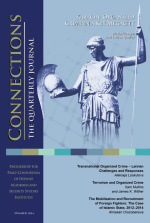Introduction
Latvia has not encountered transnational organized crime particularly frequently. However, the problem arises primarily as a result of Latvia’s geographical position, manifesting itself in:
- the illegal movement of people across the state border;
- the illicit trafficking of narcotic substances;
- criminal activity in the economic sphere;
- vehicle theft;
- human trafficking;
- corruption.
Illegal Movement of People across the State Border
The illegal movement of people across the state border involves direct illegal immigration from Russia or through Belarus, and the activities associated with this. Although this does not yet occur particularly frequently, the number of cases of this nature in 2015 is double that of 2014. Additionally, the number of people involved has increased more than twofold in 2014 and 2015 compared with the previous years. When the strong protection of the state border by Russia is considered, there are grounds to assume that officials of the Federal Security Service are implicated in the illegal activities. Immigrants use a range of methods to enter Latvia. For example, immigrants from Vietnam, Iraq and Afghanistan cross the state border itself; immigrants from Syria, Sri Lanka, Iraq, the Democratic Republic of the Congo and Pakistan use forged travel documents; migrants from the Russian Federation use Schengen visas stating false information about the reason for their arrival; migrants from the Republic of Georgia abuse the asylum procedure. The overwhelming majority of migrants from Russia are Vietnamese: having lost their source of employment in Russia, they are smuggled to Latvia by international organized groups.[1] In 2015, 87 traffickers of illegal immigrants were apprehended: 34 citizens of the Russian Federation, including 22 inhabitants of Chechnya; 31 citizens of Latvia; 6 citizens of Poland, 4 citizens of Tajikistan, 4 citizens of Estonia, 3 citizens of Iraq (all permanent inhabitants of EU) and others. The number of traffickers arrested increased more than 4.5 times on the previous year.
Illicit Trafficking of Narcotic Substances
The illicit trafficking of narcotic substances often involves the smuggling of illegal drugs and psychotropic substances from Western countries to Russia. There is also the trafficking of certain narcotic substances in the opposite direction. Latvian legal enforcement agencies initiated 614 criminal investigations regarding criminal activity of this nature in 2015. The largest amount of a narcotic substance seized in one occasion in 2015 was 1,115 kilos of hashish smuggled from Spain within a cargo of oranges. The black market price of the seized hashish was 8 to 12 million euros. The greatest potential risk of narcotics trafficking arises on the Latvian-Russian border and on ferry lines from Western Europe to Latvia.
Recent trends indicate that the former communist countries around the Baltic Sea are becoming hubs for cocaine trafficking as well, with cocaine being seized in the port of Riga (Latvia), the port of Klaipeda (Lithuania) and Tallinn airport (Estonia) in 2010. Although these were occasional seizures, indicators suggest that this area is already used for cocaine smuggling. Another feature of this recent development is the increasing use of Eastern Baltic nationals as couriers at the local level and in other areas of Europe and Latin America. The same trend has been noted with regard to the employment of Polish, Estonian and Lithuanian nationals for trafficking cocaine both in Europe and the Americas.[2] On April 13, 2015, a shipment from Paraguay containing 6 million euros worth of cocaine was seized in Riga.[3]
Unfortunately there are also cases in which Latvian citizens or non-citizens have been involved in the trafficking of narcotic substances from Latin America to Western Europe – Ireland, Spain and the Netherlands, as well as Russia. As recently as January 2016, the Spanish authorities extradited Igor to Russia: a Latvian national who “as part of an organized group illegally sent out of the Republic of Ecuador to the Russian Federation for the purpose of sale cocaine with a total weight of over 28 kg.”[4]
Criminal Activity in the Economic Sphere
Criminal activities in the economic sphere take a different form. The most widespread of them is the smuggling of the goods on which an excise tax is levied. Primarily, this comprises cigarettes with Belarussian customs seals, cigarettes without customs seals and cigarettes with Russian customs seals. 66 % of all smuggled cigarettes come from Belarus and 22 % come from Russia.
The illegal trafficking of cigarettes is performed by multinational organized groups including members from Latvia, Lithuania, Estonia, Poland, and other EU countries, as well as from Belarus and Russia. The biggest number of cigarettes seized in one swoop was 32.85 million. The case serves as an example of the intimate connection between transnational organized crime and corruption: it is not possible even to try to smuggle such a large number of cigarettes without having established contacts with dishonest public officials. In this case, three customs officers and one border officer were apprehended.
Alcohol and oil products are also smuggled. In 2015, Latvian law enforcement agencies seized almost 164 million cigarettes, 127 thousand liters of alcohol and 313 thousand liters of oil products. The prevented damage to the state budget is in the order of 26 million euros.
There is a new trend in organized crime: groups specializing in smuggling goods on which an excise tax is levied are changing their focus to concentrate on the illegal movement of humans across the Latvian border.
Money Laundering
Latvians are involved in money laundering, assisting with the legalization of fraud money received by what is known as phishing from clients of banks in Germany and some other EU countries, such as the Netherlands, Italy, the UK, and the Czech Republic. There have been cases in which Latvian banks were involved in the chain of money laundering activities. For example, three Moldovan banks “were part of a scheme, which, in the seven years up to 2014, laundered $20 billion of Russian money using a British shell company and a Latvian bank account.”[5] One of the outcomes of the investigation was the revocation of the banking license of the Latvian Trasta Komercbanka by the European Central Bank (ECB). The Latvian Financial and Capital Market Commission (FKTK) stated that it sought the revocation because “the bank [has long] committed serious violations on a number of important activities.” At the same time, the Regulator stated that it had also identified ongoing shortcomings with the bank’s operations regarding the prevention of money laundering and terrorist financing.[6] Further examples of the use of Latvian banks for international money laundering are mentioned in the Baltic Centre for Investigative Journalism’s Re:publica publication “U.S. Pressures Latvia To Clean Up Its Non-Resident Banks.”[7]
The development of international instruments against money laundering diminishes the opportunities for organized crime to legalize illicit profits. Latvia’s preparation to join the Organization for Economic Cooperation and Development has been beneficial for the country because the OECD’s anti-money laundering recommendations have helped to improve Latvian laws.
Theft of Motor Vehicles
One of the activities traditionally associated with transnational organized crime is the theft of motor vehicles and the trafficking of stolen cars, including internationally. Cars stolen in Latvia could be found in Germany, Lithuania, Estonia, Norway, Denmark, Sweden, the Czech Republic, Bulgaria, Poland, Slovenia and other countries. At the same time, in 2015 alone 166 cars were found that had been stolen abroad. There are cases in which cars stolen in the EU were trafficked to Russia or through Russia to countries in Central Asia, even via rail.
In September 2014, Latvian law enforcement officials participated in Operation Archimedes, organized by Europol. One of the outcomes of the operation was the interception of a cargo train ferrying stolen cars to Tajikistan. “Several individuals were arrested during the operation. The information collected during the investigation was used by the Latvian police to cooperate with law enforcement in Germany, Sweden and Poland, from where the cars were stolen. The exchange of information helped to identify additional members of the organized crime group, understand their modus operandi and disrupt their future activities,” as stated in the General Report on Europol Activities in 2014.[8]
In March 2015, the criminal police services of three Baltic countries stopped criminal activities being performed by the Kaunas organized group, which had encompassed 25 episodes of BMW thefts.[9]
Human Trafficking
Human trafficking becomes less widespread year on year. Only one criminal case relating to human trafficking perpetrated by an organized group was brought to court in 2015.[10] Latvia is not a destination for such activities; rather, it is the country of origin of the victims. There is a strong trend to substitute direct communication with possible victims with online methods, such as social networks, as well as travel reservation services. In 2015, six criminal investigations were initiated to examine human trafficking for sexual exploitation, the same number as in the previous year.
Corruption
Corruption is one of the necessary components of sustainable and profitable organized crime. Practically all the above-mentioned types of crime are committed with the support of—or at least thanks to the intentional passivity of—public officials, especially officials from law enforcement agencies. The most recent visible example of this comes from mid-March 2016: “Eight Latvian border guards and one customs official have been detained a part of an investigation into international smuggling rings, with two of the border guards were arrested, the State Border Guard reported on March 11.”[11]
Conclusion
The fight against transnational organized crime is possible only via international cooperation. Latvian law enforcement agencies are involved both in multilateral and in bilateral activities against organized crime, including the investigation of concrete cases. Latvia takes part in a number of Europol programs, such as “EEOC TOP 100” (Eastern Europe organized crime), “Synergy” (synthetic narcotics and precursors), “Sustrans” (money laundering), “Terminal” (forgery of credit cards), “Cannabis” (the illegal trafficking of cannabis and hashish), “Heroin” (the smuggling of heroin), “Cola” (the smuggling of cocaine), “Smoke” (the smuggling of tobacco products), “Checkpoint” (illegal migration), “Phoenix” (trafficking in human beings), “Twins” (child pornography), “Furtum” (trans-border robberies), “Monitor” (motorcycle gangs), “Hydra” (Islamic terrorism), “Soya” (euro forgery), “Copy” (copyright infringements), “Cyborg” (cybercrimes), “CTW” (Check the Web – control of the Internet), and “Travellers” (travel destination terrorism/zones of conflicts).[12]
Latvia also participates in the task force made up of Baltic Sea region countries for the fight against organized crime. “The Baltic Sea Task Force on Crime in the Baltic Sea Region (BSTF) is a platform where all the EU Member States from the region, as well as Iceland, Norway, Russia, the European Commission, Europol and Interpol co-operate. BSTF supports the participating countries, their governments and enforcement authorities in delivering a coordinated overview and initiation of activities to meet both the operational and political needs in preventing and combating crime in the Baltic Sea region.”[13]
In order to improve the quality of the investigation of criminal cases, Latvian officials participate in meetings for the coordination of investigations into transnational organized crime regarding the theft of motor vehicles, money laundering, cybercrimes and online organized crime.
Latvia has begun to build a fence on its border with Russia in order to minimize the opportunities for human trafficking, drug smuggling and the smuggling of goods subject to an excise tax.[14] The fence will cover more than one third of the state border with Russia and will be erected in places that could easily be crossed, focusing on former roads between Latvia and Russia. Most other parts of the state border are very difficult to cross because of swamps.
About the author
Dr. jur. Aleksejs Loskutovs is a deputy of the Saeima (the Parliament of the Republic of Latvia), member of “Defense, Internal Affairs and Corruption Prevention” and “Public Expenditure and Audit” Committees.
E-mail: Aleksejs.Loskutovs@saeima.lv.

